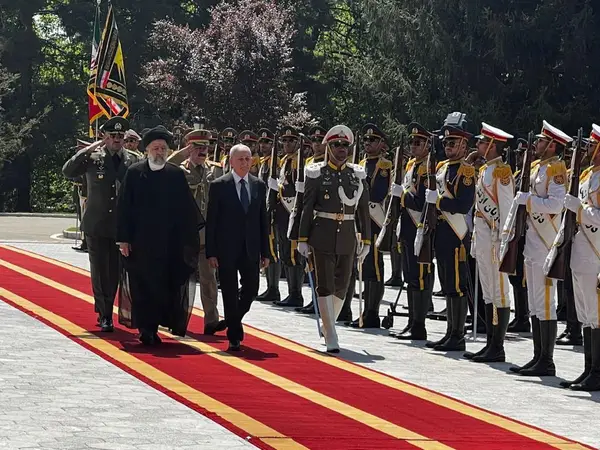Iran's president Ebrahim Raisi slammed the US presence in the Middle East during the visit of his Iraqi counterpart Abdul Latif Rashid to Tehran on Saturday.
After meeting with Rashid behind closed doors Raisi claimed “the US presence in the region disturbs regional security."
Iraq's president arrived in Tehran along with foreign, water resources, and electricity ministers as well as the national security adviser Saturday morning.
Adding that Americans think about their own interests, not those of the regional countries, Raisi said, "Our relationship with Iraq is based on common interests."
Iran, emboldened by the hasty US withdrawal from Afghanistan in August 2021, has intensified its rhetoric about forcing American troops out of Iraq and Syria.
Referring to the security agreement between the two countries in March Raisi added, “the smallest insecurity in Iraq would be viewed as insecurity in Iran; therefore, Iraq's security is important to Iran.”
Despite the eight-year war between the two neighbors in the 1980s, relations between the Shiite-majority countries have improved significantly since the 2003 invasion which led to the ouster Saddam Hussein.
Raisi further expressed hope that Rashid's visit to Tehran would be "a turning point" in improving ties between the two countries.
With sanctions hitting Iran, Iraq has become one of its major economic lifelines, while Tehran provides Iraq with electricity, gas, and other goods, although US sanctions do not allow Baghdad to make full payments in hard currency that Tehran desperately needs.
This comes as Iran’s financial network in Iraq was bypassing the US sanctions regime at the cost of the Iraqi economy. An informed source in Baghdad told Iran International late in December that Washington has received reports that Iraq is conducting trade with Iran using US dollars despite sanctions.
In early February, Iran International obtained information that revealed some details about the inner workings of a Revolutionary Guard’s Quds force unit tasked with smuggling money from Iraq to Iran. According to the information, the IRGC and the Islamic Republic’s embassy in Iraq were involved in money laundering operations that aim to funnel the regime’s revenues from oil and gas exports back to Iran. As per a repeatedly extended sanctions’ waiver by Washington, Tehran is only allowed to import medicine and some essential goods in exchange for its exports of gas and electricity to its neighboring country.
It is not clear if the issue of Iraq holding more than $11 billion of Iran's money was discussed.
For his part, the Iraqi president said his trip to Iran was intended to expand the already-prospering ties between the two countries.
“Relations between the two countries are coherent and getting stronger, and we must all work to develop them in coordination and continuous cooperation at all levels, including taking into account Iraq’s share of water, especially since most of the tributaries of the Tigris River and Shatt al-Arab originate in the Islamic Republic,” added Iraqi President Abdul Latif Rashid.
There are a number of rivers shared by Iraq and Iran, and access to them has been the source of friction in the past, contributing to the bloody war in the 1980s.
During their joint press conference, Raisi also touched upon the issue saying that “we respect Iraq's right to water according to the agreements signed in the past, and both countries must be committed and adhere to this right so as not to create problems and disruptions.”
Another topic discussed by the two presidents was the drug trade in the Middle East.
“We must cooperate in the fight against drugs, since they have become a cancer that destroys lives,” stressed Rashid.
During the past few years, the sale and use of drugs has increased in the Arab country while Iraqi security forces have intensified their anti-narcotics operations.
Iran is “at the forefront of the fight against drugs,” claimed Raisi, adding that “it is a source of satisfaction that Iraq is also determined in the fight against narcotics.”
